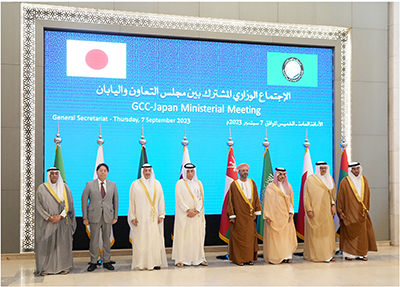Diplomatic Bluebook 2024
Chapter 2
Resilient and Unwavering Regional Diplomacy
Section 7 The Middle East and North Africa
1 Overview
The Middle East and North Africa (the Middle East) is located in a geopolitically important area: the crossroads of Europe, sub-Saharan Africa, Central Asia and South Asia. The region is a vital supplier of energy, representing approximately 50% of the world's oil reserves and 40% of the world's natural gas reserves and also is a market with high potential, pursuing the diversification of economy and decarbonization, especially in the Gulf countries, against a backdrop of a high population growth rate.
Meanwhile, the region has gone through various conflicts and disputes throughout its history, and still faces a number of destabilizing factors and challenges. In recent years, there have been signs of a change in the situation in the region toward improving relations, including the normalization of diplomatic relations between Israel and some Arab countries, but a series of events triggered by the terror attacks against Israel by Hamas and others in October has once again exposed instability in the Israeli-Palestinian issue. The immediate release of the hostages, improvement of the critical humanitarian situation in the Gaza Strip, and the early calming of the situation have become urgent issues, and Japan, in close cooperation with the countries concerned, has been vigorously engaged in humanitarian assistance and diplomatic outreach.
In some other countries and regions, tensions and severe humanitarian situations persist. In recent years, regional tensions have been growing over Iran. The civil war continues in Syria, resulting in a large number of refugees and internally displaced persons, and it has made a great impact on the stability of the entire region, including its neighboring countries. In Yemen, parties concerned, including the Government of Yemen and the Houthis, agreed on a temporary truce in April 2022, but this expired in October, and the severe security and humanitarian situation continues. In addition, since November, there have been a series of attacks by the Houthis against civilian ships sailing in the waters around the Arabian Peninsula, including the Red Sea. There are fears that the developments in Israel and Palestine may further aggravate these situations and cause further instability in the region. Furthermore, in Afghanistan, the humanitarian situation has further deteriorated since the Taliban took control of Kabul in August 2021.
The Biden administration in the United States (U.S.), which was inaugurated in January 2021, has recently been working vigorously, particularly to address the rising regional tensions surrounding the situation in Gaza and the critical humanitarian situation, including by reaching out to Israel and other relevant countries. China has also been strengthening its ties in the Middle East, and in March it was announced that Iran and Saudi Arabia, which had cut diplomatic ties since 2016, had agreed to normalize diplomatic relations through China's mediation.
Japan imports over 90% of its crude oil from the Middle East, and it is extremely important for Japan's peace and prosperity to promote peace and stability in the Middle East and to maintain and develop good relations with countries in the region. From this perspective, Japan in recent years has been striving to strengthen relations with Middle Eastern countries in a wide range of fields that include the economy, politics, security, culture and people-to-people exchanges. Prime Minister Kishida visited Saudi Arabia, the United Arab Emirates (UAE), and Qatar in July. He discussed with the leaders of these countries and others a wide range of topics, including regional and international affairs and bilateral relations, in addition to cooperation in various fields, including energy and decarbonization. In September, Foreign Minister Hayashi visited Jordan, Egypt, and Saudi Arabia. In Egypt, in addition to bilateral events, he attended the Third Japan-Arab Political Dialogue, where he affirmed further strengthening of cooperation with 21 member states and one organization of the League of Arab States and exchanged views on regional and international affairs. In Saudi Arabia, the first Japan-GCC (Gulf Cooperation Council)1 Foreign Ministers' Meeting was held to strengthen not only bilateral relations but also relations with regional cooperating organizations. In response to the situation in Israel and Palestine, Foreign Minister Kamikawa visited Egypt in October to attend the Cairo Summit for Peace, visited Israel, Palestine, and Jordan in November, and held foreign ministers' meetings with Iran, Jordan, and Lebanon in Geneva in December to help calm down the situation as soon as possible, ensure the safety of citizens, and improve the humanitarian situation. In these meetings, Foreign Minister Kamikawa also affirmed close cooperation toward regional stability with the relevant countries. In addition, amid the instability in the energy market in the wake of the situation in Ukraine, Japan repeatedly conducted high-level outreach to the Gulf countries to help with stabilization of the international crude oil market, including through telephone calls.
 Foreign Minister Hayashi attends the First Japan-GCC Foreign Ministers' Meeting (September 7, Riyadh, Saudi Arabia)
Foreign Minister Hayashi attends the First Japan-GCC Foreign Ministers' Meeting (September 7, Riyadh, Saudi Arabia)In 2023, several natural disasters occurred in the Middle East, including an earthquake in southeastern Türkiye (February), an earthquake in central Morocco (September), flooding in eastern Libya (September), and an earthquake in western Afghanistan (October), causing extensive damage. Japan has decided on and implemented various forms of humanitarian assistance, including through international organizations, to address the damage caused by these disasters.
- 1 Gulf Cooperation Council (GCC): Established in 1981 by Saudi Arabia, UAE, Bahrain, Oman, Qatar, and Kuwait. Its purpose is to promote coordination, integration, and cooperation among participating countries in all fields, including defense and economy.
